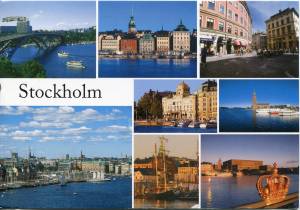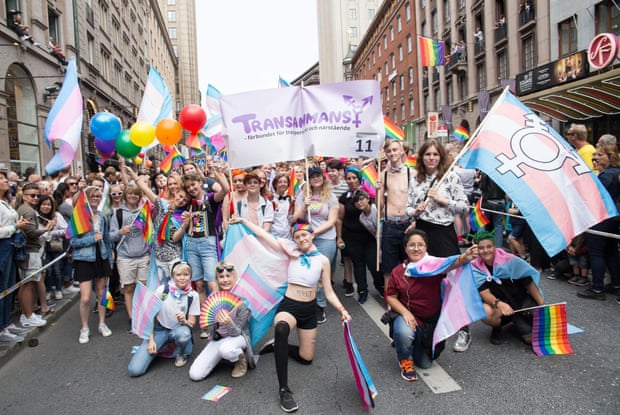Paul Lundgren is fondly remembered from our shared enthusiasm for running 5K’s and 10K’s in central Texas 30 years ago. An alumnus of Texas Lutheran and UT, he directed the Elgin Western Days 5,555-meter race every August; you could count on it to be hot. An insurance agent who always whistled a happy tune, Paul used some of his free time and energy to perpetuate Swedish history and culture in Texas. He returned to his ancestral homeland on numerous occasions. I really wonder what Paul, who died of Alzheimer’s in 2002, would think of Sweden as it is today.
I must acknowledge that I have never set foot in that Scandinavian country of 10.4 million. It and neighbors Finland and Norway have roughly the same size, shape and north-south orientation. If my  friend were still alive, he could probably tell us about its history, about the Vikings who used to run roughshod over Europe or about great Swedes like St. Bridget, Alfred Nobel and Dag Hammarskjold.
friend were still alive, he could probably tell us about its history, about the Vikings who used to run roughshod over Europe or about great Swedes like St. Bridget, Alfred Nobel and Dag Hammarskjold.
In the late 19th century, 90% of Swedes lived by agriculture. Things would soon change as emigration took place (mostly to Illinois, Iowa, Minnesota and Wisconsin in the USA), followed by industrialization and the welfare state. Since 1814, the government has maintained a policy of non-alignment in peacetime and neutrality in wartime. Admirable? Perhaps, but also convenient. As Winston Churchill said after World War II, Sweden had “ignored the greater moral issues of the war and played both sides for profit.” It was the fourth richest nation in the world by the early 1970s, with virtually no unemployment.
Let me say a word about faith and non-faith. Swedish people worshiped Norse gods like Odin, Thor and Freya until the 9th century, at which time Christianization began. That process lasted a couple hundred years, and then churches—with the usual stories of saints and their miracles—sprouted even in the far north where indigenous people called Sami lived. Catholicism for the most part gave way to Lutheranism after the Protestant Reformation and the establishment of the Church of Sweden. Rare was the family, whether rural or urban, that did not engage in daily devotions.
But the government and church, which long worked hand in hand, applied the religion of the Prince of Peace with coercion and oppression no less than love. For example, one penalty for apostasy was expulsion from the country. As happened elsewhere in Europe, secular came to trump spiritual; people fell away from Christianity. Disestablishment of the Lutheran church was made official in 2000, and by that time Sweden was one of the world’s most irreligious nations with 8 out of 10 people identifying themselves as having no faith or being convinced atheists. Divorce rates had climbed, family ties had weakened, and many people were living alone. It had become what scholars call a “post-Christian” society. Exacerbating the situation, the birth rate had fallen. Nordic countries—and Sweden was the central Nordic country—formerly enjoyed high fertility. But Swedish women now have an average of 1.66 babies, which is not enough to keep a stable population. Contemporary Annas, Marias, Evas, Karins and Kristinas (the most common names for Swedish females) have their first kid at the age of 29.7.
fell away from Christianity. Disestablishment of the Lutheran church was made official in 2000, and by that time Sweden was one of the world’s most irreligious nations with 8 out of 10 people identifying themselves as having no faith or being convinced atheists. Divorce rates had climbed, family ties had weakened, and many people were living alone. It had become what scholars call a “post-Christian” society. Exacerbating the situation, the birth rate had fallen. Nordic countries—and Sweden was the central Nordic country—formerly enjoyed high fertility. But Swedish women now have an average of 1.66 babies, which is not enough to keep a stable population. Contemporary Annas, Marias, Evas, Karins and Kristinas (the most common names for Swedish females) have their first kid at the age of 29.7.
Sweden has other pressing concerns, including the fact that 25% of its populace are immigrants or children of immigrants. Stockholm, Gothenburg, Malmo, Uppsala and other cities are chock-full of Indians, Syrians, Iraqis, Iranians, Arabs, Pakistanis, Turks and North Africans. It began, as most problems do, on a small scale. In the 1960s, Sweden was almost completely “pure” in terms of ethnicity. But when outsiders heard about the liberal dispensation of welfare benefits and jobs, they came in ever-increasing numbers.
There are today areas—which authorities euphemistically call “vulnerable zones”—with 90% immigrants and 47% unemployment, as many of the jobs once offered by warm-hearted and welcoming Swedes have  disappeared. Immigrant communities are increasingly segregated, and violent street gangs have taken over parts of this once-placid country. Attacks on police, arson and rape (not to mention ordinary crimes like theft, burglary, blackmail, and buying and selling narcotics) have led many to re-think their attitudes toward these newcomers. Riots now happen in Sweden with numbing regularity—for example, 2008 in Malmo, 2010 in Rinkeby (Stockholm), 2013 in Husby (Stockholm), 2016 in Norrkoping, Uppsala, Orebro, Boras and Borlange, 2017 in Rinkeby, and 2020 in Gothenburg, Malmo and Ronneby. Sweden now has more refugees and migrants per capita than any other European country.
disappeared. Immigrant communities are increasingly segregated, and violent street gangs have taken over parts of this once-placid country. Attacks on police, arson and rape (not to mention ordinary crimes like theft, burglary, blackmail, and buying and selling narcotics) have led many to re-think their attitudes toward these newcomers. Riots now happen in Sweden with numbing regularity—for example, 2008 in Malmo, 2010 in Rinkeby (Stockholm), 2013 in Husby (Stockholm), 2016 in Norrkoping, Uppsala, Orebro, Boras and Borlange, 2017 in Rinkeby, and 2020 in Gothenburg, Malmo and Ronneby. Sweden now has more refugees and migrants per capita than any other European country.
The large majority of these people are at least nominally Muslim. Desacralized Swedish churches have been turned into mosques, as has happened in Ireland, France, England, Holland and elsewhere. Growing numbers adhere to such polities as Al-Qaeda, Islamic State, Al-Shabaab, Ansar al-Sunna and Ansar al-Islam, and imams give fiery sermons demanding imposition of sharia in Muslim neighborhoods and that women wear the veil, hijab, burqa and chador. Swedes are watching their ancient culture perish as the Gregorian chant is increasingly replaced by the call of the muezzin.
and that women wear the veil, hijab, burqa and chador. Swedes are watching their ancient culture perish as the Gregorian chant is increasingly replaced by the call of the muezzin.
Of course, I do not seek to rationalize or justify Anders Behring Breivik’s big shoot-’em-up (77 dead) in 2011 in Norway, but his anger and alienation are understandable. There are, naturally, conservative Swedish people who are alarmed about what has happened to their country over the last half-century and call for something to be done before it’s too late.
My attention was first brought to Sweden, however, by an entirely different topic. An article in the UK-based Guardian stated that between 2008 and 2018 there was a staggering 1,500% rise in gender dysphoria for girls (boy wannabe’s) between 13 and 17, and one of 400% for boys (girl wannabe’s). If such numbers seem hard to believe, they are confirmed by Sweden’s Board of Health and Welfare.
This country has long had one of the most “progressive” stances on gay rights and other sexual matters in Europe and the world. The Swedish Federation for Homosexual Rights (1950) was among the first  organizations of its kind, and Sweden was the first country to legalize sex changes. Stockholm’s annual gay pride parade draws 40,000 participants and half a million observers.
organizations of its kind, and Sweden was the first country to legalize sex changes. Stockholm’s annual gay pride parade draws 40,000 participants and half a million observers.
Impressionable teen females in the USA have been known to gather in Internet chat rooms, all too easily saying, “Me too.” This appears to happen, at a far greater rate, in Sweden. I truly sympathize with their confusion and uncertainty about body issues, but should not wise and loving parents and church leaders intervene? Women’s rights activists as well ought to be more forceful in defending girls from doing stupid and catastrophic things.
In 2018, a BGTQL group pressured the Social Democratic-led government, and it soon promulgated a new law further lowering the minimum age for sex reassignment medical care. There would be no need for parental consent (!), and children as young as 12 (!) could make the big switch. Only then did a backlash occur, causing the proposed law to be shelved. The people at Stockholm’s Karolinska University Hospital must have been sorely disappointed. That medical institution specializes in transgender affairs, fending off accusations that it is too hasty in performing irreversible operations. It seems scandalous to me that some 14-year-old girls have undergone double mastectomies and so-called gender-affirmation surgery.
fending off accusations that it is too hasty in performing irreversible operations. It seems scandalous to me that some 14-year-old girls have undergone double mastectomies and so-called gender-affirmation surgery.
I understand that change is constant, and nothing can be done to hold it back. But all of these issues—abjuring the tenets of a once deeply rooted Christian faith, the declining birth rate, the presence of so many persons anathema to the nation’s life and culture, and the skyrocketing number of teenagers who desire to go transgender—make me tremble for Sweden’s future.


10 Comments
A splendid article, Richard. After all of these years, it is nice to see your comments regarding our late friend, Paul Lundgren, Elgin, Texas. We would occasionally ride together to an out-of-town road race. I remember the last Elgin run, Paul gave me a big medal. I told him that I placed and already had a medal. He told me that soon I would understand why. The medal still hangs on my wall.
Several weeks later, I saw him and he called me “Bubba”. He called everyone “Bubba”, but then I was informed that he was an Alzheimer’s patient. I remember having lunch with you, Paul and a few other running friends. It was the last time that we were all together. I ran one more race with Paul in Westlake, the Flamingo 5K, but he didn’t know me and I never saw him again. Paul had a friend from Sweden who visited with him. Paul talked about Sweden frequently and tried to get me to attend his church. Terrific article on Sweden, Richard, Very nice! Thanks for the memory of our good friend, Paul Lundgren!
Oh, but I think the two of us went to see him at a little community for such patients….he was already hard to handle for his wife and care-takers.
What would Paul say about Sweden if he saw it today?? Lord, have mercy!
Great article – scary stuff going on in our world. I find it hard to read how easily parents give in to the whims of their every changing children’s identities. One of my children wanted to be Casper when she was 4 – for almost an entire year!! When kids pay their own way, then they can make these life-time changes. Remember the old slogan, “Just Say No.” It’s not happening!
Thanks, Sharon. I am thinking of sending a copy of this to the Swedish embassy in Seoul.
Excellent, Richard. I’ve read that the native populaces in the northern European countries with small populations, Sweden, Norway, Holland and Belgium are well on their way to being minorities in their own countries. Too bad, but they lost their faith in God and in themselves and are in the process of giving away their countries religious barbarians.
Oh, these fools who are watching their countries implode!!! I can hardly believe it.
Richard:
Wonderful article with, as usual, great research and information. The transgender issue is quite startling and I agree with you that caring parents and church leaders should get involved. I had a close friend whose parents immigrated from Sweden when I lived in Florida and my wife worked at a tennis club in Delray Beach where her boss grew up in Sweden.
Hope you’re doing well. Thanks for your efforts.
Best wishes,
Rex
Rex–do you currently have any Swedish friends? If so, please send this to them and ask for their response.
Superbly researched and written, as are all your articles, Richard.
I feel sorry for the Swedes, but it is the same with many European countries. The “pure blonde” will probably die out in this country as well. But you can’t say that out loud if you want to remain politically correct. This is a separate issue, especially in Germany. We also face pure refugee areas, which leads to a parallel society. And the joblessness and hopelessness makes for a very high level of criminal activity in these neighborhoods. Women are also often treated like fair game. Cultures clash. Hate takes hold faster than understanding and enlightenment. This can hardly be stopped.
I personally think it is a good idea to pass this on to the Swedish embassy! Thank you for the article, Richard.
Sabine, thank you for that description of life in Germany–not so different from the horrors of nearby Sweden.
Add Comment